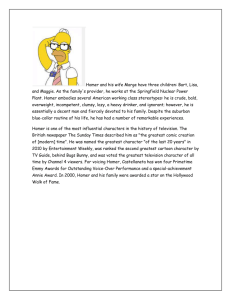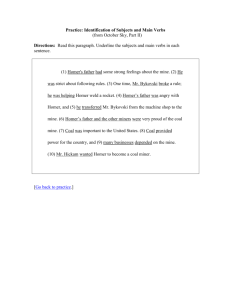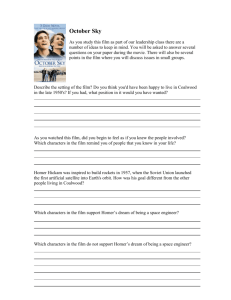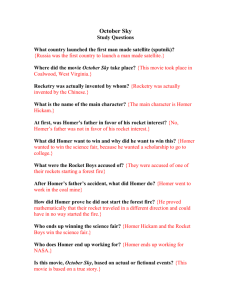Social and Emotional Issues Video Project
advertisement
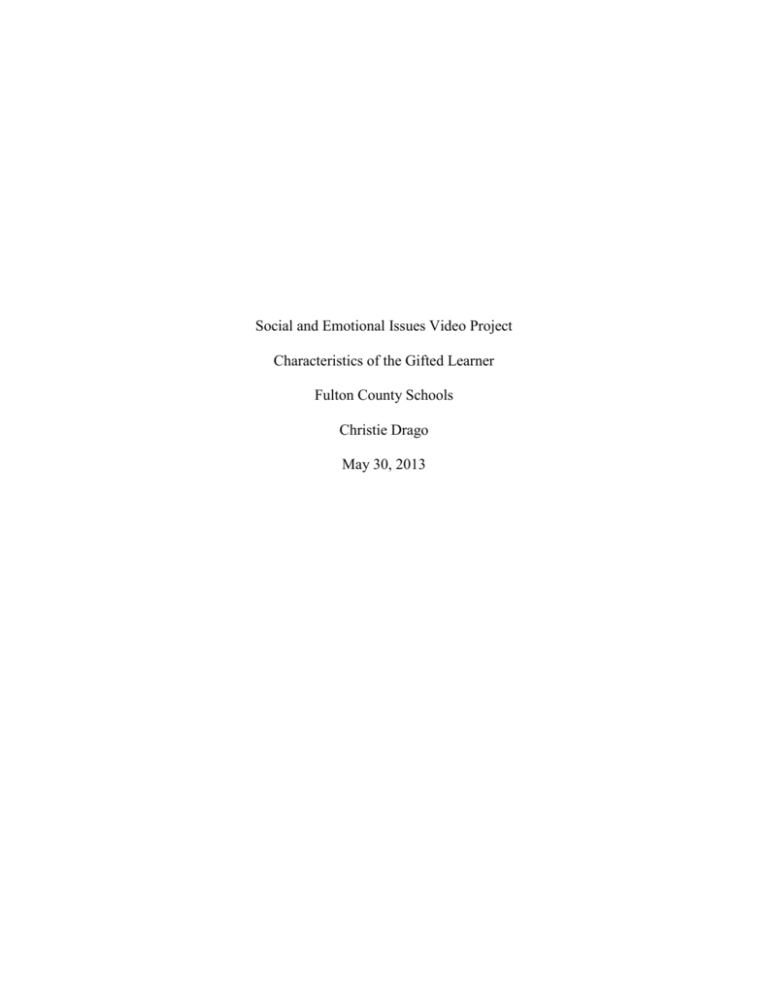
Social and Emotional Issues Video Project Characteristics of the Gifted Learner Fulton County Schools Christie Drago May 30, 2013 The film October Sky chronicles a high school student, Homer Hickam, who lives in a coal mining town in West Virginia. Despite the fact that the film is set in the 1957, the themes and struggles of the people involved are equally relevant today. Homer appears destined to follow in his father’s footsteps and make a living in the coal mine. However, he is sparked into action when he witnesses the Russian satellite Sputnik streak across the sky and he dares to dream of a world outside the mining town. Despite his tenuous relationship with his father, the negativity of the school principal, Mr. Turner, and the sneers of his older brother, a football star, Homer follows his dream; to build rockets and become a part of NASA. October Sky chronicles the journey that Homer and three of his friends take to achieve their goals, inspire a town, and prove that anything is possible. They became known as “The Rocket Boys”. October Sky should be viewed by gifted students between grades 7-12 and their parents. While it would be appropriate for the students or the parents to watch the film independently it will have a more significant impact if it was watched together. Parents can gain insights about what their gifted students deal with on a daily basis, both intellectual and social, and the students can gain understanding about what their parents are thinking and why. The film is engaging and relevant to both parents and students and can effectively serve as a springboard for conversation. Homer displays several characteristics of a gifted student throughout the film. He clearly has a strength in science and anything science related. In contrast, his math aptitude is weak. This is evidenced when his teacher, Ms. Riley states” You have a great mind but science requires math and math has never been your best subject.” That fact does not stop him. In fact, after the Rocket Boys are accused of starting a forest fire and arrested, Homer creates a math formula to calculate where a missing rocket is and ultimately proves their innocence. In doing so, Homer shows another characteristic of giftedness: persistence. Persistence is further evident when Homer and his Rocket Boys encounter defeat after defeat and problem after problem. They do not give up, they find a solution. Homer also worked independently, another characteristic of gifted students. He had to because other than the Rocket Boys, no one was going to help him achieve his dream. The principal believed his job was to “give them an education” because the boys were all going to go in the mines like their fathers and only occasionally does one “get out on a football scholarship.” Finally, Homer seems to feel alone and misunderstood by the members of the community and his family. Unfortunately, this is a characteristic of the gifted student that is not unique. There were some notable exceptions to counteract the feelings of loneliness and misunderstanding like Ms. Riley, Leon Bolden, and Mr. Bykovsky who all served as mentors, cheerleaders, and guides to Homer. October Sky is an exceptional film that depicts an exceptional young man. It provides several avenues for discussion between parents and their children to explore their own tensions and lead to understanding, acceptance, and achievement. Discussion Questions 1. What were your overall all impressions of the film? Did you relate to any of the characters? (parents and students) 2. What are the strengths and weaknesses of Homer’s father as a parent? Do you identify with any of them as a parent to your child? (parents and students) 3. Why did Homer's father want him to work in the mine? Was his father being a good parent in wanting Homer to follow in his footsteps? (parents and students) 4. Would you characterize Homer’s obsession with building rockets a rebellion? Why or why not? (parents and students) 5. What was each family member’s reaction when Homer said he would build a rocket? Have you reacted similarly? (parents) Have you had someone react in any of those ways to your ideas? (students) 6. After Homer’s father is injured in the mine, Homer states that he will quit school and work at the mine to support the family. His brother states that as the older son, it is his responsibility but does not argue when Homer reminds him of the football scholarship he will lose if he does that. Do you think that Homer’s brother and mother should have fought to keep Homer out of the mine, despite the brother’s scholarship? Why or why not? (parents and students) 7. What can you infer was going through Homer’s mind as he saw Sputnik orbiting as he was descending into the mine? What evidence from the film supports your responses? Describe a time when you felt the same or when one of your actions may have caused that feeling in someone else (parents and students). 8. Toward the end of the film, Homer states that Von Bron is not his hero and that he and his father are more similar than different. Do you agree or disagree with that statement? Provide specific examples from the film to support your responses (parents and students) 9. After being arrested for starting a forest fire, the Rocket Boys put their dreams and rocket building on hold. One of them stated, “Let’s go have fun for a change.” What was the impact of that statement? Have you ever worked so hard on something you loved and then decided it was not fun? Do you think they really were not having fun or were they trying to hide their disappointment, hurt, and anger? (parents and students) 10. In what ways do Homer and the Rocket Boys help the town of Coalwood? Do you think the boys realize how much the town is relying on them or do you believe they are following their passion? (parents and students) 11. Ms. Riley gives Homer a book, Principles of Guided Missile Design, and states “All I've done is give you a book. You have to have the courage to learn what's inside it." What does this mean to you as a student? (students) As a parent, what tools can you provide your student to give his or her the courage to learn? (parents) Follow-Up Activity Directions: Choose one of the following activities to complete. You will be expected to present your choice of activity to the group. 1. Create a conversation between Homer and his father based on the look that passed between them as the last rocket was being launched. 2. Create song lyrics to share your thoughts and feelings of the movie October Sky, the character you most connect with, the insights you gained from watching the movie. You may create a new melody or choose a melody from your time or your parents’ time. Include at least one stanza from each perspective (student perspective and parent perspective) 3. Choose a scene from the film and create a skit that depicts the opposite of what was shown. For example, what would have happened to Homer and the Rocket Boys if the part of the rocket that was stolen at the science fair could not have been replaced? What would have occurred if Homer’s father had not attended the launch of the last rocket? Implementation Plan October Sky has a runtime of 1 hour and 48 minutes. While some films can be watched in clips and in-depth discussions can occur, this film should be viewed in its entirety. In order for the parents and students to watch the film, participate in a guided discussion, and complete a follow-up activity, two days should be devoted. It can be completed during an orientation workshop designed to inform parents and students about the TAG program, characteristics, pitfalls, and guidelines, and strategies and communication skills that can be used to support the gifted child. The workshop will consist of two evenings for two hours each from 7-9. Those hours will provide time for parents to get home from work and eat dinner before reporting to the school and early enough that the students will not be out too late. Schedule Evening 1: Introduction and purpose of the workshop (this information also would go home prior to the first evening) Overview of the Discussion Questions Viewing of October Sky Distribution of follow-up activity choices Evening 2: Discussion Questions (45 minutes - 1 Hour) Work on choice of follow-up activity Follow-up activity presentations References Johnston, J. (Director) (1999). October sky [DVD]. Silverman, L. (2012). Characteristics of giftedness. Retrieved from http://www.gifteddevelopment.com/What_is_Gifted/characgt.htm The Rhode Island State Advisory Committee on Gifted and Talented Education. (1995). Characteristics and behaviors of the gifted. Retrieved from http://www.ri.net/gifted_talented/character.html
